By William M. Mathew.
A. INTRODUCTION: A JEWISH ITINERARY
B. NEW YORK TIMES REPORTS – PALESTINE
- STRIKE ON BALFOUR STARTS TOMORROW. CESSATION OF WORK TO BEGIN ON HIS ARRIVAL (24 March 1925)
- STRIKE AS BALFOUR REACHES PALESTINE. JERUSALEM SHOPS SHUT. MOURNING IS WORN BY ARABS (26 March 1925)
- BALFOUR SAYS ZION HAS WORLD BACKING. POLICY NOW BEING CARRIED OUT WILL NEVER BE REVERSED (27 March 1925)
- BALFOUR SEES WORK OF JEWISH FARMERS. ARAB SHEIKS JOIN IN HONOURING HIM. MOSLEM-CHRISTIAN COMMITTEE MANIFESTO (28 March 1925)
- BALFOUR RUMORS AGITATE MOSLEMS. “INCIDENTS” ARE AVOIDED ON PALESTINE TOUR (31 March 1925)
- HEBREW UNIVERSITY A MODEST BEGINNING. BALFOUR WILL OFFICIATE (1 April 1925)
- BALFOUR DEDICATES HEBREW UNIVERSITY. URGES ARABS TO COOPERATE. THRONGS PLOD UP MOUNT SCOPUS …AND PERCH IN TREES TO HEAR (2 April 1925)
- BALFOUR WELCOMED WARMLY AT HAIFA. WILL TOUR JEWISH COLONIES IN PLAIN OF ESDRAELON BEFORE GOING TO DAMASCUS (6 April 1925)
- BALFOUR BERATES PALESTINE STRIFE. VISITS OLDEST AND YOUNGEST COLONIES AND URGES JEWS AND ARABS TO COOPERATE (7 April 1925)
- JEWS DEDICATE COLONY TO BALFOUR. AMERICAN JEWRY THANKED. HE CONTINUES TOUR TO NAZARETH AND TIBERIAS (8 April 1925)
C. NEW YORK TIMES REPORTS – SYRIA (AND HOME)
- MOB STONES HOTEL HOUSING BALFOUR. JEWS ARE ALSO ATTACKED (9 April 1925)
- 2 KILLED, 11 INJURED IN DAMASCUS RIOT. ANTI- BALFOUR MOB CLASHES WITH SYRIAN POLICE AND FRENCH ALGERIAN TROOPS (10 April 1925)
- BALFOUR SPIRITED OUT OF DAMASCUS AS MOB SEEKS LIFE. FIERCE FIGHT BEFORE HOTEL. HE LEAVES SYRIA ON A SHIP (11 April 1925)
- LORD BALFOUR SAILS FOR EGYPTIAN PORT. HIS SHIP IS CLOSELY GUARDED BY THE POLICE AS IT LEAVES SYRIA FOR ALEXANDRIA (13 April 1925)
- LONDON CHEERS BALFOUR (25 April)
D. CONCLUSION: THE ARAB PRESENCE
A. INTRODUCTION: A JEWISH
ITINERARY

Arthur Balfour`s visit to Palestine in the spring of 1925 came at the invitation of the Zionist leader Chaim Weizmann, its main purpose being his attendance at the ceremonial opening of the Hebrew University in Jerusalem. Balfour accepted with alacrity, though as a bad sailor he anticipated the sea voyage with some anxiety, deciding to reduce the length of the journey by embarking in Naples and landing in Alexandria.

Weizmann, on board, recalled that `after Syracuse the wind sprang up and the sea became choppy, and the Balfour party was out of action for three days…..Lord Balfour did not emerge again until we docked in Alexandria`. Reaching Cairo, where he stayed for two nights with Edmund Allenby (in his last days as high commissioner in Egypt), he made his way to Palestine by a circuitous train and car route that had been arranged to avoid what the New York Times called `possible hostile demonstrations`. Official anxieties of this sort were a constant undercurrent to his itinerary, but largely kept hidden from Balfour himself.
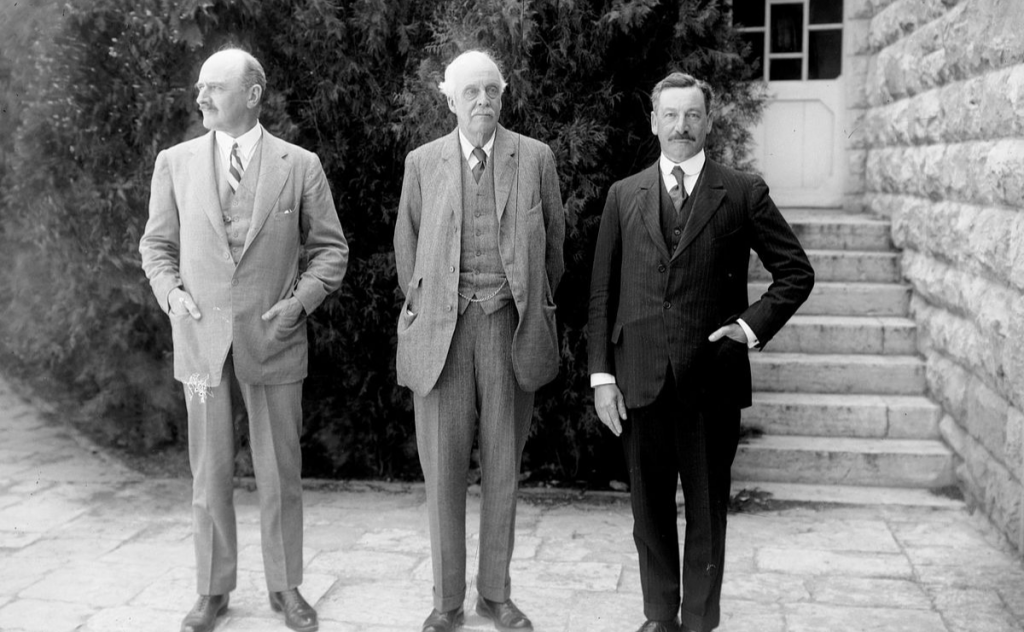
Once arrived in Jerusalem, he spent time with Allenby, Weizmann, Sir Ronald Storrs, the governor of Jerusalem and Judea, and Sir Herbert Samuel, the British high commissioner – three of whom later recorded their impressions of the visit in their respective autobiographies: Weizmann in Trial and Error (1949), Storrs in Orientations (1937), and Samuel in Memoirs (1948) – though making little or no mention of the traumatic Syria end to Balfour`s tour.
A more detailed account overall appears in the second volume of Blanche Dugdale`s Arthur James Balfour (1937). Dugdale was Balfour`s niece – `Baffy` – and although she appears not have been on the trip, it can perhaps be assumed that she got much of her information from Balfour himself some time before his death in 1930. Of later biographical studies, Dennis Judd (1968) offers no comment on the tour; Kenneth Young (1963), Ruddock F. Mackay (1985), Jason Tomes (1997), and Geoffrey Lewis (2009) have very little to say; and only R.J.Q. Adams (2007) offers more than a few abbreviated lines – three paragraphs in all.
The two main events of the journey – for which our main source is the near-daily reportage in The New York Times (then under Reform Jewish ownership) – were his presence as the principal guest at the opening of the Hebrew University on 1 April before a celebratory crowd of thousands on Mount Scopus; and his flight from Damascus on 7 April, this time having attracted another crowd of thousands, but these now placing his life in danger, forcing an ignominious escape into Lebanon to board an awaiting ship in Beirut harbour.
Balfour stayed with Herbert Samuel in Jerusalem at his residency above the city, the two playing regular games of tennis – Samuel recalling `several sets with him, each of us partnered by younger and more active players`. Thereafter he embarked on his rural rides, avoiding most of the towns and their Arab majorities. His hosts, fearful of trouble and organising strict security, deliberately kept him uninformed on the depths of Arab disaffection, allowing only the odd encounter with a few respectful locals – `in their dignified costumes`, by one New York Times description, riding `on their mares preceded by cavaliers chanting an Arab song of welcome`. From such encounters, Balfour claimed he could see `how untrue are the allegations of the impossibility of peace between the Jews and the Arabs`; opinions to the contrary were `preposterous` and `ought to be banned in all civilized society`.
The bitter truth, however, caught up with him in his near-fatal stumble into Syria, beyond the range of British protection. As Chaim Weizmann observed, it had been `hard enough in Palestine to take all the measures necessary for security`, with `thousands of young men prepared to maintain order both in the towns and on the roads….Nothing of this applied in Syria`. Herbert Samuel`s brief comment was that `hostile demonstrations on a large scale were organized by the Arab nationalists, and Balfour`s visit to Syria had to be hurriedly cut short` – The New York Times heading its report of 11 April: `Balfour Spirited out of Damascus as Mob Seeks Life`. Stephen Henry Longrigg (Syria and Lebanon Under French Mandate [1956]) comments on `serious, indeed fanatical, rioting in the city which endangered the visitor`s own life and called for military repression. Order was not restored without casualties…`.
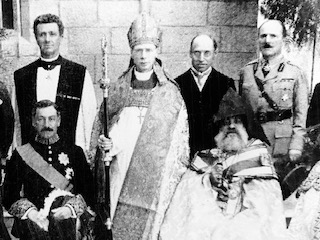
Tensions and anxieties had been apparent from the very start of the tour. Some time before Balfour`s arrival in Palestine, Ronald Storrs, the Jerusalem governor, wrote home: `A.J.B. an event much wished for by the Jews, conspued by the Arabs, dreaded by the Police`. He did find the former prime minister `fascinating company`, but was forced to conclude (with unknowing understatement) that `his visit has put the clock of reconciliation back by at least a year…`. Touring the city with Storrs, Balfour was shown all the main historic sites – `save only the Great Mosque, into which the Police and I agreed that it was highly undesirable for him to penetrate`. He had, considered Storrs, not `the faintest conception of the risk he was running, or of the strain which his presence imposed. What chance indeed had he of being allowed to realize the depth of Arab feeling when the scores of abusive telegrams awaiting him at Government House were destroyed by his secretary without his being informed of their existence`. It was evident to all, if not to Balfour himself, that the preponderant Arab population regarded him, in Storrs` words, as `an abominated enemy`.

Ignorance of Arab sentiment, part wilful, part imposed, led him to travel confidently into Syria for a few days` private sightseeing – in particular to visit (with, oddly, the Lebanese anti-Zionist George Antonius, later author of The Arab Awakening [1939]) the spectacular Roman ruins at Baalbec to the north of Damascus. But he never got there. Arriving in the capital, he encountered a hostile crowd of some 6,000 surrounding his hotel, French and Algerian troops opening fire at the cost of three lives. He was, recorded Blanche Dugdale, `both distressed and annoyed and determined, of course, to leave Syria as soon as possible`, being driven at speed with armed escort the 70-odd miles over the Lebanon border to Beirut three days before his vessel, the Sphynx, was due to set sail for Alexandria and Marseilles. Ronald Storrs describes Balfour`s `marooning on a liner in Beirut Harbour, guarded from a hostile shore by the circling of a French torpedo destroyer`.
There was, however, to be no obvious enlightenment. The Syria episode, Balfour later joked to Weizmann, had been `Nothing compared to what I went through in Ireland`. Asked on his arrival back in London by a New York Times reporter about the circumstances of his hasty departure, he replied: `I have been in no way disturbed by what happened in Damascus. Nor have I altered my views. I am more sanguine than ever about the future of Zionism`.
B. PALESTINE
1. STRIKE ON BALFOUR STARTS TOMORROW. CESSATION OF WORK TO BEGIN ON HIS ARRIVAL (24 March 1925)
Jerusalem 23 March 1925. `Wednesday and Thursday seem likely to be eventful days in Palestine. The first is the day of Lord Balfour`s expected arrival and when the Arabs, according to a decision of the Palestine Arab Executive, will greet him with a general strike, and the second the day when the Jewish community of Palestine will celebrate his coming according to plans formulated here.
`Arab public opinion seems to be divided on the decision of the Arab Executive to demonstrate against Lord Balfour. Some of the Arab newspapers expressed the opinion today that instead of making futile demonstrations, the Executive would do much better if it would endeavor to establish an Arab University in Jerusalem and not proclaim strikes and days of prayer against the opening of the Hebrew University, which the author of the “Balfour Declaration” comes to dedicate`.
2. STRIKE AS BALFOUR REACHES PALESTINE. JERUSALEM SHOPS SHUT. MOURNING IS WORN BY ARABS (26 March 1925)
Jerusalem 25 March 1925. `Lord Balfour arrived here this afternoon, having left Cairo by last night`s Port Said express in a special car sent by the Palestine Government. At Benha [rail hub 30km north of Cairo] Dr. Chaim Weizmann, the Zionist leader, with a party including Baron [Felix de] and Baroness [Rosette] Menasce [wealthy art collectors], who are prominent members of the Jewish community at Alexandria, joined the train….Special precautions were taken to prevent any untoward incident on the way to Jerusalem and Lord Balfour`s car, which was specially ferried across the canal, was not brought to the main station, but attached to the second portion of the train outside….In view, however, of any possible hostile demonstrations at Jerusalem station, at the request of the authorities Lord Balfour detrained at Ludd [Lod, 49km north of Jerusalem] and was taken by automobile through Ramleh [45km west of Jerusalem] to the Government House on the Mount of Olives, where he is the guest of Sir Herbert Samuel, the High Commissioner. Lord Balfour rested this afternoon and will go to Jaffa tomorrow to attend a reception and other ceremonies at Tel Aviv [founded 1909 next to Jaffa; population 15,188 in 1922 census, of which 15,065 Jewish]….
`At an early hour the office of the Arab Executive was draped in black, as also were the principal Arab houses, and many persons wore black rosettes or ties….In the walled city all Moslem and Christian shops were shut and the Jews also closed theirs out of caution [Jerusalem population 1922 – 62,578, of which 33,971 Jewish, 14,899 Christian, 13,413 Moslem]…. The shop strike certainly was quite effective, and the sight of the principal streets of old Jerusalem without a soul in them and all shops shuttered by a long line of bars and padlocks was most depressing and converted the place into a veritable deserted city….

`The Arabs appear quite satisfied with the result of the day`s efforts….They felt they had to do something to show that hostility to the British policy was not confined to agitators among them, and had planned today`s programme as being best calculated to indicate to the world how bitterly they resent what is happening to their country….
`Reports from various districts show that the Arabs` strike was complete at Haifa and that all the Government schools at Tulkeram [Tulkarm, Muslim city 100km NNW of Jerusalem] struck….An interesting feature of the Arab protest has been that some Arab newspapers today published an English edition with a black border. Still more significant is the fact that at midday prayer in the Dome of the Rock among the speakers on the subject of Lord Balfour`s visit two Christians spoke in defense of the Arabs. It is unprecedented that Christians should be admitted to this Mosque on such an occasion…`.
(Two further short despatches, from Beirut and London respectively, reported:
`A number of Palestinian students of the American University at Beirut struck work today on the occasion of Lord Balfour`s arrival at Jerusalem and sent him a telegram of protest against his famous declaration`; and `Two members of the Palestine Arab Executive were arrested when Lord Balfour left the Cairo station, according to a despatch from Jerusalem to The London Daily Mail. They were arrested because they shouted “Down with Balfour”, the dispatch states`.)
3. BALFOUR SAYS ZION HAS WORLD BACKING. VISITS OLD SETTLEMENTS. POLICY NOW BEING CARRIED OUT WILL NEVER BE REVERSED, HE DECLARES IN FIRST SPEECH (27 March 1925)
Jaffa 27 March 1925. `Lord Balfour visited Richon L`Zion [8 km south of Tel Aviv; founded 1882 by settlers from Ukraine and Romania; population 1,373 Jewish, 23 Muslim in 1922] this morning and made the first public statement since his arrival. Replying to speeches of welcome Lord Balfour said he rejoiced at this opportunity to visit the oldest Jewish settlement in Palestine in modern times, of which some of the original founders were present….
`Today`s tour included visits to a number of Jewish colonies, as well as Tel Aviv, a suburb of Jaffa, and wherever he went Lord Balfour was enthusiastically received. He left Jerusalem at 10 o`clock in the morning, motoring along the road with wonderful hairpin turns, up which Allenby`s troops plowed their way to capture the Holy City and where are still visible traces of trenches, both British and Turkish. On the way he passed…Ramleh, which today is the headquarters of the British force in Palestine, with the adjacent Lodd, strangely reminiscent of war days, to Richon L`Zion, practically the oldest of Jewish colonies, where a great reception awaited him.

`Lord Balfour, who was accompanied by Dr. Weizmann and Mr. Sokoloff [Nahum Sokolow, Zionist journalist, born Poland {Russian Empire} 1859], was met on the outskirts of Richon L`Zion by a company of young Jews on horseback who escorted him to the main avenue. Here a great concourse was assembled and formed two compact lines right up to the synagogue, which stands at its head. Lord Balfour had much difficulty in making his way and every now and again had to stop to greet the people who pressed around. He was conducted to the synagogue, where the ark was opened in his honor….

`Thereafter Lord Balfour drove through the colony to the wine factory, which he inspected….Richon is the largest and most flourishing of the colonies, with a population of 3,000 and an estate of 8,000 acres, valued at well over $2,000,000….It is delightfully situated and well run. Its wines have a good sale all over the Eastern Mediterranean as well as in various parts of Europe.
`Lord Balfour was addressed first by the Mayor, next by Mr. Merovitch, a fine-looking white-haired man, one of the first forty immigrants who came from Russia and Rumania forty years ago, and who is one of the founders of Richon. Lord Balfour then spoke….His words, which Mr. Sokaloff translated, were received with wild enthusiasm.

`From Richon, Lord Balfour motored to Mikveh Israel, an agricultural college founded in 1870 by the Alliance Israelite Universelle. Here he lunched and, after a short rest continued his drive to Tel Aviv….The whole place was en fete for the occasion, and crowds came in from other colonies. From the moment his car was sighted coming down the Jaffa road, Lord Balfour had a triumphal progress proceeding at slow pace to the gymnasium where there was a pleasant little ceremony. On his arrival he was greeted with a hallelujah chorus from Handel`s “Elijah” [sic], beautifully sung by a mixed choir. Then the Mayor of Tel Aviv asked Lord Balfour to accept the freedom of their city and allow his name to be given to one of the new streets….A pretty little incident followed when two garlanded baby girls handed Lord Balfour a bouquet`.
4. BALFOUR SEES WORK OF JEWISH FARMERS. ARAB SHEIKS JOIN IN HONORING HIM ON HIS VISIT TO NEW SETTLEMENT AT DILBER. MOSLEM-CHRISTIAN COMMITTEE MANIFESTO (28 March 1925)
Jerusalem 27 March 1925. `Motoring all the way from Tel Aviv, preceded by cars of the military escort, the Earl of Balfour made only one stop, in the vicinity of the Crusader Church at Enab. Here he visited Dilber, on the opposite side of the valley, one of the most recent Jewish settlements, which is being run as a farm. Among those who gathered to meet Balfour were the sheiks of the three adjoining Arab villages, who told him they lived quite happily in proximity with their Jewish neighbors. Police arrangements throughout the visit were excellent, the crowds being orderly in spite of their excitement, but some Jewish Communists were detained on Lord Balfour`s arrival. Tomorrow Lord Balfour intends to spend a quiet day and on Sunday he will read the lessons in the Anglican Cathedral of St. George.
`The morning was spent by Lord Balfour in visiting the sights of Tel-Aviv, including some more important industrial enterprises founded under Zionist auspices. Among them was the electrical power station, which forms part of the much- talked-of Rutenberg [Pinhas, born Russia 1879] scheme for harnessing the Jordan….Lord Balfour also went out to the water tower and proceeded to an agricultural research farm at Ben Shamed near Ludd….He then visited a sand brick factory….The visit to Tel-Aviv was concluded after a private luncheon in Lord Balfour`s honor at the casino.`
Tel-Aviv 27 March 1925. `…Lord Balfour in a speech following the conferring on him of the freedom of the city [said]. “I believe, with you, in the development of a future Palestine which should be based on its glorious [i.e. pre-Arab] past. My hope in this direction is based on many reasons, mainly because the Jews know very well their future and the future of this immortal country. The success of the Zionist efforts depends upon their conviction that the revival of Palestine should be not only for the benefit of the Jews and Palestine, but for all of humanity. The Jews are able to give to the world a new moral force and their future will certainly not put to shame the great traditions of the past. Wherever I come I see proof of the fact that the Jews came to this country to stay and to work. The new generation is full of life and animated by a desire for work. I share with you all hopes for a glorious future.`
Jerusalem 27 March 1925. ` In a manifesto signed by Omar Bittar [Al-Bitar, past mayor of Jaffa imprisoned by British] as President of what is termed the Moslem-Christian Committee [1921-38], circulated among the Arab population of Palestine and cabled to the League of Nations, and to the British press, a protest against Lord Balfour`s visit, Sir Herbert Samuel`s administration in Palestine, and the British government was expressed. The manifesto reads:
“The Moslem and Christian population of Palestine considers Lord Balfour`s visit to their country to join the celebration at the opening of the Hebrew University a confirmation of his declaration made on behalf of the British Government to build a national home for the Jews in Palestine, which signifies the ultimate ruin of the Moslem and Christian population of Palestine. Throughout the country we consecrate today to prayers in all churches and mosques for deliverance from the Zionist aggression which is supported by British arms. We renew our protests against the British Government and raise our voices to the British public and world opinion against the great calamity that has befallen us and our dear country…”.
`Leaders of the Palestine Arab Executive still continue to display their dissatisfaction with the visit of Lord Balfour to Palestine. More than a hundred protest telegrams were received by Lord Balfour today from various districts. Arab newspapers appeared with black borders on their special English page in which it was declared that Balfour was “merely a label to a parcel of explosive fabricated by Dr. Weizmann…”`.
5. BALFOUR RUMORS AGITATE MOSLEMS. `INCIDENTS` ARE AVOIDED ON PALESTINE TOUR. BRITISH PARTY PAYS VISIT TO JERICHO (31 March 1925)
Jerusalem 30 March 1925. `A rumor which spread among Muslims in the city that Lord Balfour intended to visit the Dome of the Rock mosque today was entirely groundless but caused considerable excitement.
`Lord Balfour, accompanied by Sir Herbert Samuel, motored this morning to Jericho, where he lunched and made the usual round, afterward visiting Allenby Bridge [built on remains of Ottoman Jordan crossing by Edmund Allenby 1918] and the Delta.
`The idea is widespread that Lord Balfour is a Jew, particularly among the Muslims, who say no one of another religion could be so enthusiastically received here. Even instructed Muslims take a long time to be convinced to the contrary, while among the lower classes nothing can eradicate the impression`.
6. HEBREW UNIVERSITY A MODEST BEGINNING. BALFOUR WILL OFFICIATE (1 April 1925)
Jerusalem 31 March. `Jerusalem is filled with guests for the inauguration of the University tomorrow. Those here include some of the most distinguished representatives of European and American universities….Accommodations are taxed to the limit and the congestion was increased by the arrival of a large number of tourists today. The city is perfectly quiet. At a reception at the Governor`s House tonight the foreign representatives and guests were asked to meet Lord Balfour….
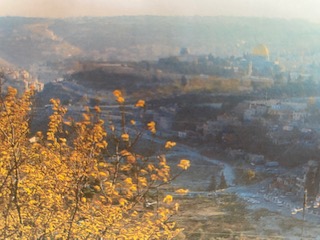
`All that the Hebrew University now has to show is a site on Mount Scopus, the northern extension of the Mount of Olives with some buildings – formerly a private house built by Sir John Grayhill [John Edward Gray Hill, maritime lawyer and Zionist supporter, bought Scopus land 1889, d.1914] – in process of enlargement and adaptation: the beginnings of a microbiological and bio-chemical laboratory and some lecture rooms. The teaching activity at present is confined to three professors, lecturing six hours a week…and the students, about 100, are drawn in the main from the schoolteacher class. The subjects taught are Palestinian Topography, by Rabbi Dr. Samuel Klein ; an introduction to the Talmud, by Dr. Michael Guttmann, and Biblical versions and elementary Greek by Professor Max L. Margolis….
`Jerusalem is yet unable to attract the foremost of Jewish men of learning, and the most promising of Jewish students. Endowments have come in as yet only comparatively sparingly, and the right use of these has been a hotly debated point among both the University trustees and the interested Jewish public….This institute has been violently attacked from many sides. The severest criticism is leveled against the principle adopted by the trustees of the institute that the study of the subject matter of the Old Testament is to be excluded….
`The Guardians of the Hebrew University …propose to pursue the…course of first creating, or trying to create, an atmosphere and tradition. Their ideal is that it shall have something to give, some inspiration to spread, which shall be specifically and idealistically Hebrew and a contribution to the soul of Judaism, which the exile has come so near smothering….
`Lord Balfour leaves on Sunday by a special train for Haifa, stopping at one of the Jewish colonies on the way, and during the following three days he will motor to Nazareth and Tiberias and visit the various colonies on the Plain of Esdraelon, including Balfouria, named for him`.
7. BALFOUR DEDICATES HEBREW UNIVERSITY. URGES ARABS TO COOPERATE (2 April 1925)

MOUNT SCOPUS 1 APRIL 1925
Jerusalem 1 April 1925. `All roads in Palestine today led to the summit of Mount Scopus, where the Earl of Balfour this afternoon inaugurated the new Hebrew University, the creation of which has aroused enthusiasm in Jewry the world over. From early morning, when special trains began to arrive from districts as far distant as Haifa and Tiberias, there was a continuous stream of motors of every description up the long road leading to the peak, while the sides of the hill were black with pedestrians plodding the way up, anxious to acquire positions of vantage. Among the dense crowds thronging the vicinity of Mount Scopus, were large numbers who were refused admission owing to the restricted space and had to content themselves with remaining on the offside of the wall. Jewish hawkers did a thriving trade with “Balfour chocolate” “Balfour biscuits” and even “Balfour keftas”…. `Situated almost on the spot where Titus camped when he besieged the Holy City [AD 70], and within a stone`s throw from the German Hospice, now the Government House, perched on top of the adjacent Mount of Olives, the site affords a view of Jerusalem and the surrounding country unsurpassable in beauty, magnificence and interest…
`The opening ceremony was held in the open air in an amphitheatre erected on the Greek design on the mountainside just below the university buildings….The amphitheatre faces due east, and those assembled there today cannot fail to treasure in their memory the unrivalled panorama full of biblical associations unfolded before their gaze – the wilderness of Judea, and beyond the wonderful hills of Moab, with the Jordan Valley and the Dead Sea between….
`The ceremony was started at 3 o`clock, but long before that every available inch was occupied…Even the trees were filled….The enthusiasm of the 8,000 spectators was more notable by the fact that many attending were unable to afford fares and walked many miles from the outlying colonies, taking several days on the way….There on the central tribune sat on either side of Dr. Chaim Weizmann, who presided, Lord Balfour…and Sir Herbert Samuel, High Commissioner for Palestine, at whose right hand sat Field Marshall Lord Allenby, who had been especially invited as having liberated Jerusalem and been present when the foundation stone of the university was laid [1918]….
`Then Balfour arose and with him the whole assembly. The crowd cheered so loudly that some time passed before he could speak. The Earl spoke without notes, but had to pause from time to time owing to the applause and was again enthusiastically cheered when he finished….Lord Balfour, in his speech, said: “What is that which has brought together this vast concourse from every quarter of the world, often speaking as their mother tongue languages far separated in human speech but all gathered here on this great, historic occasion in a land in which historic associations crowd upon the memory every step you take, from the north to the south, from the east to the west? It is not the magnificence of the view stretched before you. It is the consciousness that this gathering marks a great epoch in the history of a people who made this little land of Palestine the centre of great religions, whose intellectual and moral destiny is from a national point of view reviving and who will look back to this day we are celebrating as one of the great milestones in their future career.

“A few minutes ago I was reminded by friends that from where you are sitting you can see the very spot where the children of Israel first entered the Promised Land, and that it was from this very hill that the Roman destroyers of Jerusalem conducted their siege which brought to an end that great chapter in the life of the Jewish people. Could there be a more historic spot? From this hill you can see what then appeared to be an end of the Jewish community in the land they made illustrious.

“A new epoch has begun within the Palestine which came to an end so many hundred years ago. Not that I would think for a moment that all Jewish culture in the interval between the destruction of Jerusalem and the expulsion of the Turk had ceased – far from it. It has been uninterrupted but it has been scattered. It has been the culture of Jewish people living within traditional limits of the country, which they have rendered so famous: it was separate efforts of separate individuals, separate men of science, separate theologians, separate philosophers, scattered over the habitable globe. They have borne their share in the progress of civilization. I think it is a profound mistake to suppose that men of Jewish birth have not borne their full share in the progress of knowledge and in the growth of civilization. The whole world over these have done so, although scattered and unable to concentrate their peculiar national genius in a common task. I confidently expect in the future they will be able to give aid even more important.
“It is because of these peculiar past circumstances that we are now engaged in adapting Western methods and the Western form of the university to an Eastern site, and it is education which is to be in an Eastern language that is the new experiment. It has never been tried before under any circumstances parallel to those of which I speak. Unless I utterly misunderstand the signs of the times, unless I have profoundly mistaken the various Jewish peoples, the experiment is predestined to inevitable success, on which not only men of Jewish birth but others sharing the common civilization of the world will have reason to congratulate themselves”.
`Balfour then dealt with the difficulties which beset the Hebrew University`. “One which will naturally strike everybody is the problem of language. It is true Hebrew has never been a dead language until recently adapted to many phases of modern development. It is a great language. I say so with boldness, though I do not know any Hebrew, and I say so for the reason that all English speaking peoples have been brought up on a translation into English of the Hebrew Scriptures, and that translation is one of the great literary treasures of all who speak the English tongue it matters not what their creed may be or what their view of the historic value of the Hebrew Bible may be.
“Clearly the Jewish people have a great instrument of literary instruction, capable of dealing with all the higher aspects of literary and imaginative literature: but does it follow from that Hebrew is fitted for modern uses? There is a great difference between Isaiah and microbiology. Is the language and poetical imagination of Isaiah fitted to deal with the laboratory work which is going to render this spot illustrious?”
`Lord Balfour spoke highly of the theory of relativity, crystallized largely through Einstein, the mathematician. After mentioning other Jewish scientific geniuses, he said`: “I do not mean to suggest that all the great scientific work of the world has been done, or is going to be done, by men of Jewish birth; but it is worth noting by those looking with doubt upon the ideal of a Jewish university for Palestine devoted to scientific research, what an important part in the problems interesting mankind the Jews are playing.

“I hope the Arabs will remember that in the darkest days of the dark ages, when Western civilization appeared almost extinct and smothered under barbaric influences, it was the Jews and Arabs together who gave the first sparks of light which illuminated that gloomy period. If, in the tenth century, for example [as in Cordoba], the Jews and Arabs could work together for the illumination of Europe, cannot Jews and Arabs work now in cooperation with Europe and make this not merely a Palestinian university, but a Palestinian university from which all sections of the population of Palestine may draw intellectual and spiritual advantage?”`
8. BALFOUR WELCOMED WARMLY AT HAIFA. ENDS JERUSALEM STAY. WILL TOUR JEWISH COLONIES IN PLAIN OF ESDRAELON BEFORE GOING TO DAMASCUS (6 April 1925)
Haifa 5 April 1925. `Lord Balfour accompanied by Dr. Weizmann, Nahum Sokaloff and the rest of the Zionist executives, arrived here this afternoon. The journey from Jerusalem was delightful, as the heavy rains of the past two days cleared the air and brought out wild flowers in profusion. The Plain of Esdraelon [Meggido] is being carpeted with poppies, white and yellow daisies and anenomes. The first stop after leaving Jerusalem was at Petach Tikvah – Door of Hope – the oldest Jewish colony [10.6 km east of Tel Aviv], founded in 1878, which soon afterward had to be abandoned temporarily, owing to the heavy mortality, due to the marshes among which it was then situated. It has now become the richest and most flourishing of all the Jewish settlements.
`The colony has paid off a mortgage of £100,000, which it incurred. It is a delightful spot, with miles upon miles of oranges, almond and grapefruit groves….Lord Balfour was enthusiastically received and was presented with a beautifully engraved casket, decorated with precious stones and containing a scroll narrating in Hebrew and English the story of Petach Tikvah. A pleasing feature was the singing of a song of welcome by children. Lord Balfour, in a speech of thanks, warmly congratulated the colonists on their success`.

Jerusalem 5 April 1925. `Lord Balfour left Government House last night and slept at the station in the High Commissioner`s private railway car. His train at 7.45 o`clock this morning left for the north, where under the auspices of the Zionist executive he will shortly make a tour through the Jewish colonies on the Plain of Esdraelon before going to Damascus and Beirut. Lord Balfour`s stay in Jerusalem lasted less than a fortnight, during which he was present at ceremonies and receptions almost daily and visited many sites of special interest. His sightseeing, however, was entirely confined to Christian and Jewish monuments.
`Interested persons interpreted the absence of disturbances or other untoward incidents as proof that the Arabs accepted the situation. In reality there were other reasons for the remarkable calm which reigned in the Holy City during the past ten days. In the first place the Arab community was repeatedly assured that it was not by provocative but by peaceful and dignified action that they were likely to arouse for their cause the sympathy of the British and other nations….As many Arabs have taken pains to let it be known, it troubled them sorely that they were unable to extend the traditional courtesies to such a distinguished man, but the course they adopted was, in their opinion, the only pacific means open to them to draw the attention of the world to their feelings regarding British policy.
`How determined they have been in this respect was proved on at least three occasions during the past week. The first was on a day when it was rumored in the bazaar that Lord Balfour was about to visit the Haram Eshsharif, where the Dome of the Rock stands near the sites of the temples of Solomon and Herod. This caused considerable excitement among the younger Moslems and the door of the Haram had to be closed for a time, although there was no foundation for the rumor. The second occasion was the case of two members of the Moslem Commission who, on their way through Jerusalem, desired to visit the Haram but were stopped at the door until it was proved conclusively that they were not members of Lord Balfour`s party. The third was a similar personal experience`.
9. BALFOUR BERATES PALESTINE STRIFE. URGES JEWS AND ARABS TO COOPERATE (7 April 1925)
Haifa 6 April 1925. `After a visit to the oldest Jewish colony, Petach Tikvah, yesterday morning the Earl of Balfour visited the youngest colony, Benjaminia [founded 1922 by Baron Edmond Benjamin James de Rothschild (French: not Lionel Walter the recipient of the Declaration), population in that year 153, of whom 137 Jewish] situated an hour`s journey further north on the way from Jerusalem to Haifa. Here he saw what the younger generation is doing. The colony was founded and mainly managed by sons of colonists from the older settlements, and many of them were born here in Palestine. It was named after Baron de Rothschild, who gave the Jews the land and advanced money for building….One particularly useful piece of work these colonists are doing is the drainage of some 3,000 acres adjacent to Khabtah marsh, which ought to add to the productivity, wealth and salubrity of the area….
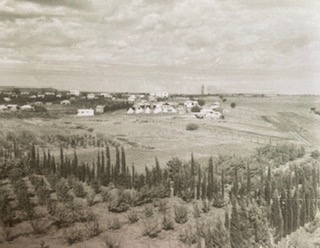
`The pioneers in the colonist movement to Palestine fifty years ago took Lord Balfour to luncheon, and afterward an Arab farmer informed him that in his forty-three years` experience in that district fifty-two Jews and Arabs lived together without any dissension. Lord Balfour in reply…said it was “preposterous that Jews and Arabs were unable to live together in harmony”, and the theory would finally be exploded and no longer admitted to national political controversy. The controversy arose over petty motives. He said it constructed nothing and ought to be banned in all civilized society.
`After leaving Benjaminia, Lord Balfour and his party proceeded to Carmel Station, where he alighted instead of going into the town of Haifa and drove to the Zionist Technical Institute, which forms part of the Hebrew University of Jerusalem. The Institute is ideally situated on a promontory at the foot of Mount Carmel, within a stone`s throw of the bay. Balfour was received by 3,000 Jews who assembled in the grounds.
`Official figures now available show that the school strike organized as a part of the Arab protest against the Earl of Balfour`s visit to Palestine proved a complete fiasco…but there is said to have been every reason to believe that this discipline would not have been maintained and the strike would have been more extended had not educational authorities adopted so firm an attitude when rumors about the possible strike reached them several days before the date fixed for the Earl of Balfour`s arrival. Precautions were then immediately taken. The authorities…decided that this first attempt at engineering a school strike in Palestine and introducing politics into the schools should be nipped in the bud.`
10. JEWS DEDICATE COLONY TO BALFOUR. AMERICAN JEWRY THANKED (8 APRIL 1925)
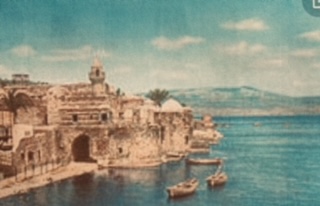
Tiberias 7 April 1925. `The Earl of Balfour left Nazareth [66% Christian, 33% Muslim, 1% Jewish 1922] this morning for what is for all practical purposes the last stage of this tour through Palestine – Tiberias and the Jewish colonies at Galilee. He stopped at Kiryat Schemeli, the new suburb of Tiberias, built two years ago and named after Sir Herbert Samuel, the High Commissioner.
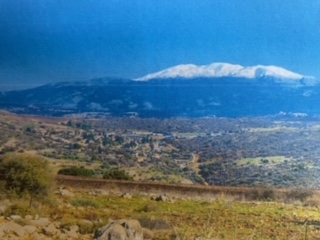
`Thence he passed through the town of Tiberias [64% Jewish, 30% Muslim, 6% Christian 1922] with its black basalt walls and went about fifteen miles northward to Rosh Punah, one of the oldest Jewish colonies and the first to be started in Galilee. Here Lord Balfour was blessed in the synagogue, where an unusual occurrence took place, an Arab sheik delivering an address saying he had lived in perfect harmony with the Jews. After luncheon Lord Balfour and Dr. Chaim Weizmann made speeches, and before the party left Rosh Punah three Algerians informed Lord Balfour that they were living very contentedly side by side with the colonists. Afterwards Lord Balfour motored to Tabgha, a Jewish [actually 90% Muslim in 1922; site of biblical loaves & fishes miracle; Balfour possibly visiting out of pious curiosity] colony on the Sea of Galilee, close to the ancient Magdala [ref. Mary Magdalene], where he spent the night before leaving for Syria tomorrow`.
Nazareth 7 April 1925.` The Earl of Balfour spent last night at the hotel on top of the historic Mount Carmel, from which he had a superb view of Haifa [ethnically diverse city of c25,000 in 1922, roughly one-third each Muslim and Christian, one-quarter Jewish]] on the northeastern slope, and of the bay below. In the distance were the hills of Galilee and the majestic Mount Hermon, with its glistening snowcap.
`It was an inspiring sight as Lord Balfour`s party motored eastward, bound for Nazareth and the Jewish colonies on the Plain of Jezreel (sic). The country was remarkably green and was bright with wild flowers and fields of mustard dotted with patches of red poppy and yellow daisies mingled with the Star of Bethlehem. About seven miles out from Haifa we came upon a site full of interest. We had seen colonies in all stages of development. Here we saw one actually being hatched under the care of about thirty men and women, who were busy erecting wooden huts. They explained that they had arrived only a week ago from Poland in a party of seventy families, having purchased, with the assistance of the Zionist organizations, 9,000 acres on which they proposed to settle. Many of them were not agricultural folk and some had been well-to-do trades people….

`Soon afterwards the party came in sight of Lord Balfour`s first objective, the cooperative Colony of Nahahal [first moshav {individual farms} in Palestine; land, bought from Arab absentee landlords – village of Ma`alul – by Zionist Palestine Land Development Company in 1921: initially 80 equal plots set out in concentric circles] which looked snug and pleasant as we gazed down upon it from afar….Nahahal was founded three and a half` years ago near a vast swamp with mosquitos infected with malaria. The Germans forty years previously had attempted to colonize the place, but were compelled to abandon the scheme and the Arabs used to say that even birds could not exist here.
`In their short time the colonists have raised 60,000 vines, 30,000 fruit trees and 25,000 other trees in addition to building a dairy. The seventy-five families in the settlement cultivate 2,000 acres cooperatively….Lord Balfour was led into the “People`s House”, a simple wooden hut, decorated with branches, where the head of the colony told him its history and regaled him with strawberries. Lord Balfour congratulated the colonists on their remarkable achievement and went on to say that it is idle to assert that Jews were townsfolk, for there was ample and conclusive proof that they could turn into agricultural communities. ‘About twelve miles further on we visited Nazareth with its curious cypress trees on either side, but we had to pass by and press on, for our goal was Balfouria [third moshav in Palestine, established 1922 with 18 Jews at outset]. Ascending the last range of hills, we looked down upon the Plain of Jezreel spread out before us….Balfouria…lying just in front of the hill on which stood Nain of New Testament fame, and behind it the celebrated Endor. Down a series of acute hairpin bends we ran on to a place where another rousing reception awaited Lord Balfour.
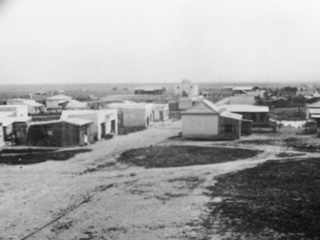
`This time he was received by a large cavalcade, of which a large proportion was Arabs from Belzan and the Jordan Valley men from Transjordania, who made a unique picture in their dignified costumes as they carcolled on their mares preceded by cavaliers chanting an Arab song of welcome. Lord Balfour entered the main avenue, on which he planted a fir tree. Halfway along this highway he was met by the Rabbi of Jaffa standing under an awning symbolizing the Tabernacle of old, and holding the Tora, the scroll of the Law. The Rabbi offered bread and salt in Oriental manner and invoked a blessing on King George and on the visitor. Lord Balfour appeared to be much affected….
`Balfouria was founded in 1922 in honor of Lord Balfour on the anniversary date of the signature of his famous Declaration in 1917….[and] comprises 100 families of about 500 souls, many of them being Jews from America. The colony is supported by the American Zion Commonwealth….The inhabitants are engaged in agriculture on a large scale and produce wheat, maize and also tobacco, which is purchased by a large British manufacturer who has established a cigarette factory at Tel Aviv….After luncheon all assembled for speeches….Lord Balfour…[saying] that the Jews have concentrated neither on the material aspect nor on the abstract consideration of the development of learning, but that they see both ideals must be combined, and the University of Jerusalem and the Technical Institute of Haifa [presently Technion] on the one hand must be balanced by the great commercial and agricultural efforts such as those being carried out here….
Jerusalem 7 April 1925. `Tribute to the generosity and assistance of American Jews in the colonization of Palestine was paid by Lord Balfour….”This community owes a debt of gratitude to the noble American Jews….When American Jews see what has been achieved here, they will rejoice at the marvellous feat. The settlements in the Valley of Jezreel are not a series of separate enterprises, but the result of deliberate and resolute thought and plan. I see clearly the progress attained, which is not only material but spiritual as well, a progress which is a combination of matter and spirit. The university and the colonies produce what I would call a practical idealism”`.
Rosh Pinah 8 April 1925. `Biblical custom still maintained by Palestine Arabs was observed today by the Jewish settlers of Rosh Pinah when several sheep were slaughtered for the luncheon given in honor of Lord Balfour, following festivities in this colony [land purchased from Muslim villages in 1882, settled by Romanians and Russians under Rothschild patronage; 468 population of which 460 Jewish in 1922]. Very impressive scenes occurred before the luncheon, when Arab and Jewish riders escorted the Balfour party to the synagogue, where Sheik Muhamed Ali, on behalf of the Arabs of Galilee, assured Lord Balfour that he had been living for the last thirty-five years with Jews and had never observed any trouble, expressing the hope that this harmony will continue. The same spirit animated the address of another Sheik who, greeting Lord Balfour, affirmed the harmony which exists between the Arabs and their Jewish neighbours, and thanked Great Britain for sending an able representative to administrate Palestine.
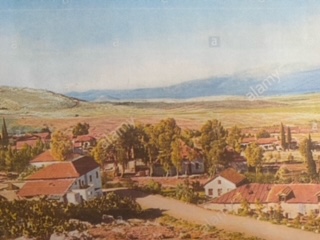
`After shaking hands with the Arab Sheiks Lord Balfour delivered an address in which he stated that the Balfour declaration embodied a policy of peace and it is a profound mistake on the part of those who exaggerate little events and shut their eyes to the wider and world-affecting aspects of this policy, alleging that it would produce discord. “After my visit to Palestine I now see how untrue are the allegations of the impossibility of peace between the Jews and the Arabs. The time is not distant when both the Arabs and Jews in Palestine will see that the declaration meant peace and prosperity, both material and spiritual for Palestine”.
`That the Jewish people in rebuilding Palestine will base their work on the basis of justice and equality, without interfering with the rights of the other communities, was the declaration made by Dr. Chaim Weizmann, President of the World Zionist organization, who delivered the farewell message to Lord Balfour. “We invited Lord Balfour to visit Palestine…in order that he may see how his declaration is being put into effect, what were our achievements, and to demonstrate the Jewish capacity for doing things, which we are unable to do in the diaspora. Palestine is a bridge between Asia and the other continents of the world. It can perform great duties for the benefit of humanity. With this in view, the Jewish people fully realize their responsibility and know that the future of Palestine depends on their friendly relations with the Arabs”`.
C. SYRIA
1. MOB STONES HOTEL HOUSING BALFOUR (9 APRIL 1925)
Damascus 8 April 1925. `A mob gathered today outside the Hotel Victoria, where the Earl of Balfour is staying, and stoned the building. Police forces were hastily summoned and prevented further trouble. Lord Balfour, who is touring through Palestine and whose visit has caused resentment on the part of some of the Arabs, arrived at Damascus only today.
`The demonstrations began outside the Hotel d`Orient, but the demonstrators dispersed, finding that Balfour was not there. Learning that he was staying at the adjacent Hotel Victoria they reassembled with angry shouts….Showers of stones were hurled and a dragoman was hit. Police drove the crowds into the square opposite, where fiery speeches were delivered. Several arrests were made. Quiet was restored by 10 o`clock, but the police remained on guard outside the hotel. Lord Balfour was much upset by the incident. He said he had no idea of possible trouble and would not have come to Damascus if he had been warned`.
2. `2 KILLED, 11 INJURED IN DAMASCUS RIOT. ANTI- BALFOUR MOB CLASHES WITH SYRIAN POLICE AND FRENCH ALGERIAN TROOPS (10 April 1925)
Damascus 9 April 1925. `Two persons were killed and eleven injured in a fight today between a mob opposed to the Earl of Balfour and Syrian police and French Algerian troops.
`After prayers in connection with the Ramadan festival a crowd of about 6,000 marched in the direction of Victoria Hotel, where Lord Balfour is staying. Because of the attack against this hotel last night, extra precautions had been taken. Syrian police attempted to check the demonstrators, but were stoned. Fierce fighting ensued and Algerian troops were summoned to the aid of the police. There were disturbances also in the Jewish quarters.
`This is the most serious disorder marking the visit of the Earl of Balfour to the Holy Land. He himself appeared to be surprised at the stoning of his hotel. The resentment against Lord Balfour arises through his work in the establishment of a national Jewish home in Palestine.
`Lord Balfour will continue his tour of the Holy Land tomorrow, when he leaves for Baalbek, Syria`.
London 9 April 1925. `The Arab protests against Lord Balfour were brought up in the House of Commons today by a question asked by Captain Waterhouse [Conservative, Leicester South], who termed the Arabs “law abiding” and wanted to know if the Government would remove their grievances.
`Major Ormsby-Gore, Parliamentary Undersecretary for the Colonial Office, gave him little satisfaction, maintaining that Palestine was administered in strict accordance with the mandate, and declared that he was unaware that the civil or religious rights of the Arabs were in any way prejudiced.
`Captain Waterhouse suggested that the Arabs were aggrieved at the lack of representation in the legislative body.
‘Major Ormsby-Gore explained that various efforts to secure the Arabs to cooperate in the legislative counsels had so far met with no success. He also stated that the military garrison in Palestine was not reinforced on account of Lord Balfour`s visit`.
3. BALFOUR SPIRITED OUT OF DAMASCUS AS MOB SEEKS LIFE. FIERCE FIGHT BEFORE HOTEL (11 April 1925)
Damascus 10 April. `The Earl of Balfour`s arrival in Damascus was made the occasion for a furious outburst on the part of the Arabs, which culminated yesterday in a riotous demonstration which threatened his life, and which the police were powerless to disperse. Only the intervention of military forces saved the situation.
`Fearing hostile demonstrations against Lord Balfour, the British consul and a delegate from the French High Commissioner met the Balfour train at Kadem station, outside Damascus, where he put up at the Hotel Victoria….Elaborate precautions were taken en route to insure Lord Balfour`s safety. From Semakh at the southern end of the Lake of Galilee, Palestine, gendarmerie accompanied the party to the Syrian frontier, where the Syrian authorities provided protection. Armed sentries were posted in the train and at every station. At Deraa [Syria, on border] a crowd awaited Lord Balfour`s arrival, but caused no disorder, and the journey to Kadem was uneventful.

‘Wednesday night`s demonstration outside the Hotel Victoria was only preliminary, and today the feeling reached its zenith in a monster outbreak. On the train we [switch here to anonymous first-person narrative] had a warning, and after our arrival there was a good deal of talk of further trouble, but it was generally believed that there would be little real danger. However, it was pointed out that the shutting of shops was likely to increase the anger, and this proved correct. When I saw the delegate of the High Commissioner attached to the Syrian Government in the morning I was told that there was reason to believe that a demonstration would be held, but that all preparations were made to prevent it becoming serious, and barricades were being erected to protect the hotel where Lord Balfour was staying….

`About 11 o`clock, the time at which the demonstration was generally expected to take place, I motored through the native quarter. All the shops were shut with the exception of some food shops. In Jerusalem during the one-day strike there the streets were all deserted; here the streets, especially the Hamadia Bazaar and “The Street That Is Called Straight” [as mentioned in New Testament; the old East-West decumanus maximus] were full of people, obviously laboring under some excitement, but showing no hostility to foreigners. Outside the great mosque there was a great crowd similarly agitated. Everywhere armed police and gendarmes were posted….This coincided with the conclusion of the mid-day prayer in the great mosque, where both inside and outside large crowds were harangued by a leader.
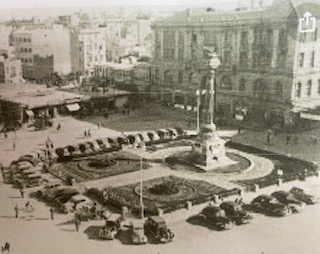
`The crowd had been skillfully managed by the police as far as the El Margi [main square]. By the time they reached this place they were fairly worked up, and shouting “Down with Balfour! Down with the Balfour Declaration!” they quickly made their way down the Barada [river] toward the hotel, but were barred by gendarmes both on foot and on horses, who had been hurried from every direction. No time was lost in giving warning to the crowd, which by now numbered nearly 6,000, by firing a blank cartridge.
`I took up a position on a balcony of the Municipal Building, from which there was an ideal view of the El Margi and the street leading to Lord Balfour`s hotel. The warning did not stop the mob and as fast as they were driven down a side street they pressed back by another with ever growing fury. Soon stones were flying, and as always happens on such occasions there were ready at hand heaps of stones dumped for road repair and the gendarmes were compelled to keep up a fusillade of blank cartridges and charge with the butts of rifles.
`The mob rapidly grew violent and hand-to-hand fights occurred. Some of the demonstrators actually tried to pull gendarmes off their horses and wrest rifles from them. About one o`clock a breakthrough occurred down one side of the Barada leading to Lord Balfour`s hotel and there was a mad race between the mob down one side and police reinforcements down the other side of the river to reach the hotel first. The latter won, fortunately, for if the mob had reached the hotel they certainly would have burst in, and so infuriated were they by this time that the consequences might have been very grave.
`As it was several anxious minutes were spent holding the mob back at a corner and the situation was saved only by a daring gendarme officer who laid himself flat on his horse`s back and drove through the crowd, pressing it back by brute force. This broke the pressure at this point, but hand to hand fighting continued all the way down the street to the El Margi. On the way the mob seized three street cars, from which they were dislodged with difficulty. The firing all the time was deafening, but the firing of blank cartridges and the charging with the butts of rifles failed to disperse the mob, which maintained its determination to reach the hotel and continued to stone and otherwise to attack the police and the gendarmes.
`As the situation was becoming serious the military was called in. At 2 o`clock the Spahis [light cavalry units of French army, locally recruited] appeared and charged down both sides of the Barada toward the El Margi. The mob fled, followed by the galloping horsemen with drawn swords. On El Margi the flats of swords had to be used and finally the crowds were driven off the square into side streets, where at a respectable distance they continued to shout angrily. The Spahis were followed by eight armored cars, which entered the narrow streets leading off El Margi and drove the crowds further back. Officially it is reported that the casualties are two gendarmes and eleven of the mob injured, but it is certain from what I myself saw from the balcony of the Municipal Building that many more of the mob were injured. It is likely, too, that many of the wounded are probably hiding in houses, fearing punishment if they show themselves.
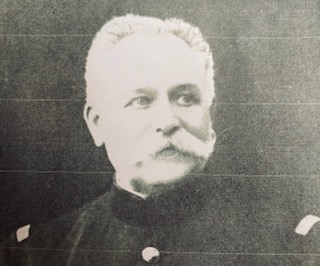
`At 3 o`clock in the afternoon General Serrail [French high commissioner] visited Lord Balfour in the hotel and remained a short time. About an hour afterward he reappeared in his car, halted on the bridge leading from the station across the Barada to the street in which Lord Balfour`s hotel is located and called up various officers, with whom he had long consultations. This proved a blind to divert public attention, as also were two airplanes which simultaneously appeared overhead and dropped smoke bombs, for while General Sarrail was talking a car drove up to the hotel and Lord Balfour and his party entered and drove off to a secret destination. As soon as he saw that the party had safely left, General Sarrail, who obviously advised Lord Balfour to leave, saluted the officers standing around him and drove off.
`This was really a regrettable termination to the visit, but obviously the best solution, for no doubt Lord Balfour`s continued presence in the city served as a distinct provocation. The outbreak was most serious, and at one time Lord Balfour`s life was gravely threatened. The fact that none was killed does not diminish its gravity. Instead, it is a tribute to the exemplary restraint of the police and of the troops and the great judgment of the officers under acute provocation. Lord Balfour repeatedly told me how deeply he regretted it all. The last thing he wished was to create trouble for the French. His visit to Syria was intended as a pleasure trip, and had he had the slightest inkling that it would cause disturbances he would never have come`.
Beirut 10 April 1925. `The Earl of Balfour and his party, who travelled in two cars, escorted by police from Damascus, are now aboard the steamer Sphinx under police protection. The party reached Auir-Sofar at 8 o`clock yesterday evening, where the French Director of Public Security met them and escorted them by a circuitous route via Pigeon Rocks, to the military quay whence they boarded the Sphinx. Lord Balfour will remain aboard the Sphinx until it leaves for Alexandria`
4. LORD BALFOUR SAILS FOR EGYPTIAN PORT. HIS SHIP IS CLOSELY GUARDED BY THE POLICE AS IT LEAVES SYRIA FOR ALEXANDRIA (13 April 1925)
Beirut 12 April 1925. `The Earl of Balfour sailed this morning on the steamer Sphinx for Alexandria, Egypt. General Sarrail French High Commissioner for Syria, who came down last night from Damascus to attend the official Easter mass, visited him before his departure. The police closely guarded the approaches to the steamer until she left and Lord Balfour did not go ashore after he had once gone aboard`.
(Three days later: `Several young men, mainly students, gathered on the promontory of Ras Beirut to shout protests against the Balfour declaration through megaphones while the steamship Sphinx with the Earl of Balfour aboard, rounded the point on the way to Egypt`.)
Beirut 12 April 1925. `Beirut has been quiet, and official reports from Damascus show that the agitation there has died down, though at one time on Good Friday there was some fear that the Moslems would attack the Jews, and troops were sent as a precautionary measure to guard Jewish quarters. A high French official, with whom I discussed the situation yesterday, told me that the great demonstration which ended in a riot in Damascus, had been quite unexpected. It was not known that feeling about Lord Balfour`s visit was running high, and while it was expected and feared that individuals might attack him, mob action was not thought of. The official explained that the people of Damascus are very fanatical and can in a short time work themselves into a fury….The official list of casualties gives 12 rioters and 11 police and soldiers wounded and only one rioter killed….
`My French friend remarked on the quickness with which Lord Balfour`s departure from Palestine was followed by the events in Syria and said that communications between the Moslems of Palestine and those of Syria are very close, as despite the international frontier they have remained one people in sentiment as well as in religion. In consequence of this it is necessary for the British and French officials to cooperate as closely as possible….
`The newspapers yesterday devoted much space to details of Lord Balfour`s secret arrival at Beirut and their comments were invariably sympathetic with the demonstration. The whole affair has unfortunately produced amenable [sic] effect on all shades of public opinion. Inquiries made by the police of Damascus show that there was [sic] no Palestinians among the ringleaders of the riot and all those arrested were Syrians….
London 12 April 1925. `Commenting on the Damascus riot on the occasion of the visit of the Earl of Balfour, the London Times editorially says it is not necessary to assume that the riot was directed altogether against Lord Balfour personally. “It is incredible that the population of Damascus City, where there is no Jewish question, feels more acutely about the Balfour declaration than the population of Jerusalem. The demonstrations in which Damascenes indulged were obviously organized in advance with the support of the local leaders, who desired to embarrass the French authorities. It is quite likely that they were the work of Arab nationalists and more particularly of the pro-Sherifian elements, who, among the other national grievances of which Damascus is the focus, have neither forgotten nor forgiven the overthrow by the French of the short-lived emirate of Syria in 1920….Those who allowed and even advised Lord Balfour to visit Syria are responsible not only for permitting him to risk his life, but also for causing what might easily have been a most difficult situation between the two great powers whose cooperation in the Near East is what General Weygand [Serrail`s predecessor as high commissioner, 1922-23] described as an imperious necessity.
`“Why was Balfour not warned of the feeling in Damascus before he left the residency at Jerusalem? Apparently there were no doubts about the true facts of the position. A special correspondent has stated that he was told on the train before reaching Damascus that trouble was expected. As soon as he arrived a French official informed him that there was reason to believe that a monster demonstration would be held. We are told again that the European population of Damascus felt some indignation that the programme of the visit should have been carried out in spite of the stories that had been sent from Syria to Jerusalem. It is clear that those stories were never allowed to reach Lord Balfour`s ears, for in his natural distress at the danger to life and property caused by his visit he told the correspondent that had he had the slightest inkling that his visit to Syria would have caused trouble he never would have come….Those who either disregarded the plain warnings from across the border, or who wilfully concealed them from Lord Balfour, may consider themselves fortunate that their misguided optimism has not been productive of graver consequences”`.
[Hansard: House of Commons 4 May 1925: Anthony Eden, then a 27-year-old p.p.ps. at the Home Office, asked the colonial secretary, Leo Amery, `whether any warning was received by the Government of Palestine prior to Lord Balfour`s visit to Damascus as to the possibility of that visit taking place`: to which Amery replied that no such warning had been given.
`On the 4th April, however, the Palestine government learnt that a rumour was current in Haifa that Lord Balfour would be attacked in Syria – probably at Beyrout. The rumour was immediately communicated to the French authorities in Syria, who had been informed a month before of the proposed visit. They gave assurances that they would take all possible precautions to ensure Lord Balfour`s safety`.]
5. LONDON CHEERS BALFOUR (25 April 1925)
London 24 April 1925. `The Earl of Balfour arrived in London this evening on his return from Palestine. Although there was no formal reception, many hundreds of admirers and members of the Zionist movement gathered around the station platform and cheered when he stepped off the train. The cheers lasted several minutes and were renewed when he entered his motor car. Lord Balfour was delighted and surprised over the warm welcome. He looked bronzed and well.
`In conversation with The New York Times representative Lord Balfour said that the trip was a most interesting one from beginning to end. He was asked regarding the events in Damascus and said: “I have been in no way disturbed by what happened in Damascus. Nor have I altered my views. I am more sanguine than ever about the future of Zionism. I think it is being approached in the right way and the Jews are fully conscious than ever about of the necessity of working harmoniously with the Arabs. In fact, it is coming and would be there now if agitators would leave things alone.”`
D. CONCLUSION: THE ARAB PRESENCE.
If Palestine had been an Arab-free `land without a people for people without a land`, Balfour`s days there would, as recorded, have constituted a deservedly triumphant tour around a coming new state that he had had a major hand in creating – the 1917 Declaration bearing his name for all time; European Jews fleeing their ghetto sufferings in Europe to build their own society and polity in the Levant; the place itself carrying numberless Biblical resonances to register emotionally with pious people back home; and the incomers, by another Zionist trope, seen to be `making the desert bloom`. It was a uniquely creative enterprise, and it must have been hugely gratifying for Balfour, in his final years, to visit his conceptual handiwork and be acclaimed enthusiastically by its beneficiaries in the Easter sunshine.
The first high commissioner, Sir Herbert Samuel, later reflected on the beauty of the newly blossoming land: ‘Memories of many visits to Jewish agricultural settlements form a composite picture – wide roads, bordered by little white single-storied houses well spaced out, with creepers over their porches; round them little gardens of flowers and patches of vegetables, with fields of waving corn and young plantations of trees beyond; groups of men and women in working-clothes, smiling girls, and beautiful healthy white- dressed children; overhead the cloudless blue sky. They were a happy population, with good reason to be happy – an intelligent well-educated peasantry, close to the soil, working with a purpose`.
The validity of the unpeopled-land notion rests on the indefinite article, often missing in quotation: `land without a people`, the assumption being that Arabs, though present, did not constitute a single community in the way that Jews allegedly did. `The country`, remarked a future Israeli prime minister, Shimon Peres (David`s Sling, 1970), `was mainly an empty desert, with only a few islands of Arab settlement`, these not representing any sort of unitary society. This was, of course, a piece of tendentious, racially-charged word-play, but it has long served as one of the founding myths of the Yishuv. Generalised denigration of this sort was crudely expressed by Chaim Weizmann, writing to Balfour about the Arabs` `treacherous nature`, their typical leader being `dishonest, uneducated, greedy, and as unpatriotic as he is inefficient` and regretting the passage of the times when `baksheesh was the only means by which matters administrative could be settled` (such harsh private sentiments contrasting with his Rosh Punah, 8 April, public claim that `the Jewish people…know that the future of Palestine depends on their friendly relations with the Arabs`).
Travelling around Palestine in conditions of strict security; spared learning of the large volume of Arab submissions to the authorities protesting over his visit; seeing only the burgeoning Jewish rural settlements and their enthusiastic inhabitants; kept away from the towns and their Arab majorities (excepting Tel Aviv, which was almost entirely Jewish, and Jerusalem, heavily so, where he was sheltered by Herbert Samuel – though even there, it was recorded, his touring `was entirely confined to Christian and Jewish monuments`), Balfour might well have felt that this was indeed an essentially Jewish land. Random encounters with Arabs almost invariably took place outside the urban centres, colourfully dressed individuals and groups turning up on horseback (as in Dilber 29 March, Balfouria 6 April, and Rosh Punah 8 April) to proclaim, as possibly prompted, their enduring friendship with their Jewish neighbours – relationships dating back to pre-Declaration days when Arabs had little sense of any threat from Jewish immigration.
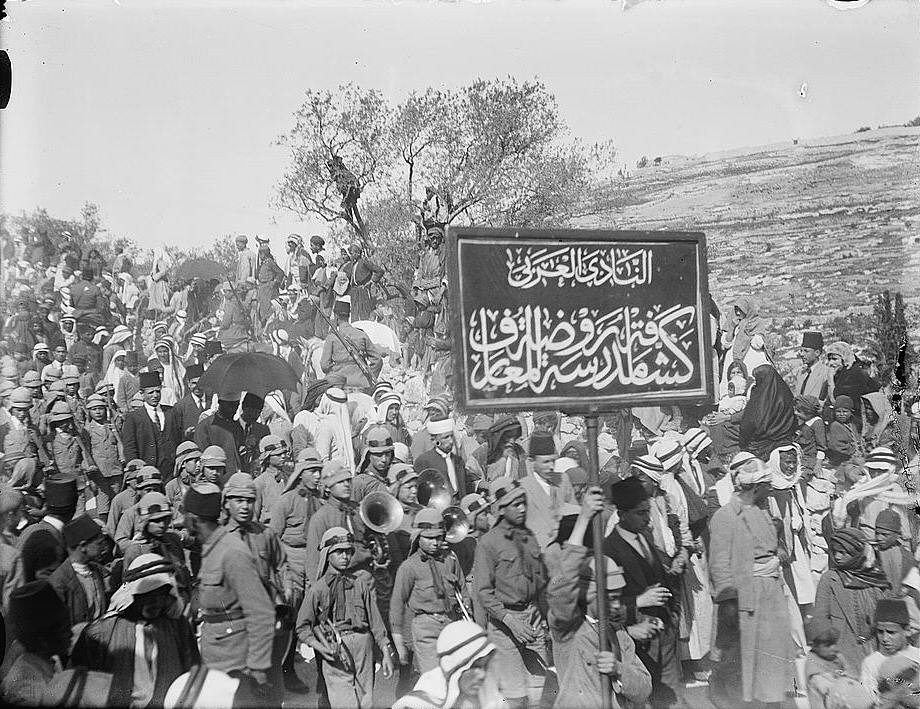
`Up until a very recent date`, suggested Sir Philip Palin`s Commission in 1920 – set up to examine the causes of the Nebi Musa disturbances in Jerusalem and beyond – `Moslems, Christians and Jews lived together in a state of complete amity`, the typical Jew being `a humble, inoffensive creature` and the Arabs constituting a centuries-old `true peasantry rooted in the soil`. Such prevailing social harmony, however, had lately been disrupted by the arrival of `immigrants from Eastern Europe` – these being `men of a very different type … backed by apparently inexhaustible funds`, and manifesting degrees of `indiscretion and aggression` that had led to `an `exceedingly dangerous` situation needing `firm and patient handling if a serious catastrophe [was] to be avoided`.
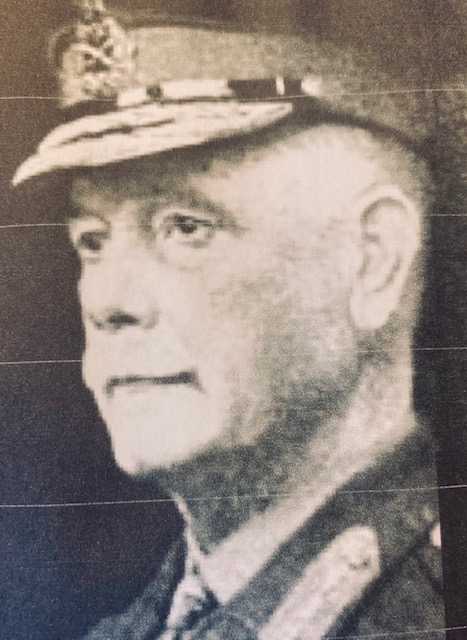
There is no record of Balfour meeting, or wishing to meet, Arab political leaders, despite the detailed record of their post-1917 disaffection as itemised by Palin (major-general in Indian Army, latterly serving in Egypt and Palestine) – and subsequently, in 1921, by the Palestine chief justice Sir Thomas Haycraft. The judgements set out by Palin were never published, but were, presumably, available for Balfour`s inspection. The detailed report, based on the evidence of 152 witnesses submitted during sittings lasting 50 days, reflected acute official concern over the prospects for the new Levantine polity. This, it might have been expected, would have had some influence on Balfour`s priorities in his round of meetings in Palestine. That it did not, serves as evidence of a casual disregard for the evolving political crisis there, his settling instead for a self-indulgent tour around a few carefully selected bubbles of acclamation.
Palin took note of the rapid deterioration that the promotion of Zionism, and attendant aspirations towards a Jewish state and Jewish land-ownership, had caused in Arab attitudes to Britain – in what was, after all, a part of the world of great strategic importance to London (see previous post, March 2021: `India, Palestine, and the Balfour Declaration‘). A `friendly people`, disappointed in Britain`s failure to accord them their much- promised post-war political independence, had now changed into one in which `ninety percent of its numbers` had become `definitely hostile to the British Administration`. It was, Palin declared `impossible to minimise the bitterness of the awakening`. Haycraft, examining subsequent riots in Jaffa, said much the same thing in 1921: `had there been no Jewish question, the Government would have had no political difficulty of any importance to deal with so far as domestic affairs were concerned`.
The Zionist Commission, moreover – set up to protect and advance Jewish sectional interests – was turning into what Palin termed a `full blown Administration`, in which all the departments of the official British authority were `duplicated by the Zionist Commission` – in, inter alia, Justice, Defence, Intelligence, and Public Health. The then Chief Administrator, Sir Louis Bols, held that `this state of affairs cannot continue without grave danger to the public peace and to the prejudice of the Administration. The situation is, in truth, intolerable`. Arabs, to their acute dismay, saw `the Administration repeatedly overruled by the Zionist Commission…`. The `native population`, Bols continued, `disappointed of their hopes, panic-stricken as to their future, exasperated beyond endurance by the aggressive attitudes of the Zionists, and despairing of redress at the hands of an Administration which seems to them powerless before the Zionist organisation, lies a ready prey for any form of agitation hostile to the British Government and the Jews`.
Such warnings were commonplace well in advance of Balfour`s tour. In a Commons debate in June 1921, his colleague in the Lloyd George government, the colonial secretary, Winston Churchill, plainly acknowledged that `The difficulty about this promise of a national home for the Jews in Palestine is that it conflicts with our regular policy of consulting the wishes of the people in the mandated territories`, the problem being that if they were allowed a voice in present circumstances `they would veto any further Jewish immigration…`. The current inflow from Central and Eastern Europe and `the propaganda by which it has been accompanied,` said Churchill, `has greatly alarmed and excited the Arab population` given `the continuous and ardent declarations of the Zionist organisations throughout the world…of their hope and aim of making Palestine a predominantly Jewish country…`.
Concerns of this sort, accompanying many others private and public in similar vein, were stark in their political implications for effective British rule in Palestine and across the wider empire beyond. But there is no indication that Balfour took any notice of them in advance of his trip, or that, if he did, he chose to act on them. He certainly made no mention of Palin or Churchill in his 1922 maiden speech on Palestine in the Lords [see previous post, May 2021: `Experiment and Adventure. Balfour Defends his Declaration`]. Bland, abbreviated rhetoric was delivered, as on Mount Scopus, merely inviting Arabs to accept the new Zionist settlement – but without the merest attempt to address their anxieties.
A further detachment from reality, this time near-fatal, is evident from his strange Syria adventure. British officials could disguise harsh truths from him in Palestine, but their French equivalents in Syria had no reason to attempt any such thing. What is telling is Balfour`s obvious ignorance of France`s troubled dealings with its new mandate, a principal contribution to the political mayhem there being the separation of Palestine from Syria, thereby rupturing the cultural unity of the two entities as integral components of Ottoman Greater Syria since the early-16th century. Communications between the two, observed the New York Times, were `very close, as despite the international frontier they have remained one people in sentiment as well as in religion`. The journalist Joseph Jeffries offered the same perspective in 1923: `Palestine is nothing but the southern part of Syria`: whatever the individual mandatory names, `from Syria`s northern point at Alexandretta to Gaza in the south, all the inhabitants of the land speak the same tongue, bear the same names, have the same appearance`. (The Palestine Deception, 1915-1923 [2014].)
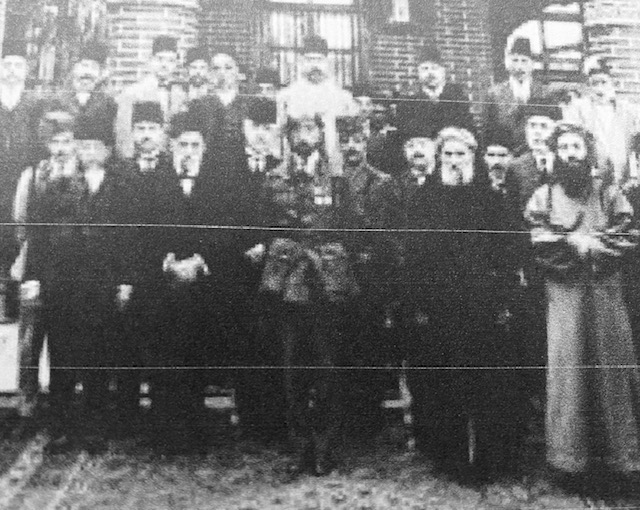
Much disorder had also been generated by France`s removal of the Hashemite king, Feisal, in July 1920, only a few months into his rule in Damascus, to make way for their own stern mandatory regime, with the accompanying separation of Syria from Palestine compounded by the break-up of the state into separate political entities in a futile attempt to inhibit nationalist resistance. The Times of London`s view – as quoted above, 12 April – was that one objective of the anti-Balfour riots had been `to embarrass the French authorities` – the `pro-Sherifian elements` in Damascus having `neither forgotten nor forgiven the overthrow by the French of the short-lived emirate of Syria in 1920`. But the transfer had been unavoidable, Longrigg (op.cit) writing: `Nothing … which the Syrians in Damascus…could now say or do could stop the execution of the decisions which France had long regarded as predestined`, the Syrian nationalists suffering from `an incomplete knowledge of the politics of the international world…`.
It appears further evidence of Balfour`s woeful ignorance of prevailing realities in the Levant that he chose to wander unprotected into this dangerous polity for a few days sightseeing, genuinely surprised that his presence could be so furiously contested. Forecasts of likely trouble were, reported the New York Times, `never allowed to reach Lord Balfour`s ears` – but it had of course been entirely open him to make his own elementary enquiries. It does seem remarkable that a former British foreign secretary, so intimately connected with Levantine affairs, had not acquainted himself with the well publicised travails of the neighbouring French mandatories, as well as with the historic and persisting reality of the Syria-Palestine nexus – `Greater Syria`. It was only a matter of weeks after his visit that the so-called Great Syrian Revolt broke out, lasting the better part of two years, and at the outset mainly involving the Druze state of Jabal Hawran just north of the Palestine border – and, again, angrily challenging the social and political validity of that very border.
The Revolt, partly triggered by the heavy-handed anti-Druze provocations of Balfour`s rescuer in Beirut, the high commissioner Maurice Serrail – described by Michael Provence in The Great Syrian Revolt (2006) as `an enthusiastic bearer of French civilization` but `with no knowledge of Syria`- was in the end suppressed, but viciously so, by means of `collective punishment of entire towns…wholesale executions … population transfers…and round-the-clock aerial and artillery bombardment of civilian populations`, at the cost of thousands of lives and the flattening of much of Damascus.
Syria, sliced off from Palestine by imperialist share-out, but still intimately and perilously connected with it, had been no place for a casual British sightseer of inflammatory repute.
E. END NOTE
For the aged Balfour, ignorant, unseeing amour-propre trumped statesmanship throughout his journey. On the question of Arab-Jewish mutual tolerance and cooperation, so critical for the success of his Declaration, the best hope he had to offer on Mount Scopus was to trawl back to medieval precedent: `If, in the tenth century…the Jews and Arabs could work together for the illumination of Europe`, then surely, a millennium later, they could perform cooperative work again. It was fantasy politics of the most vacuous sort.
His final words when he got back to London, as recorded by the New York Times, perfectly typified the official mind-set and misreading of anti-colonial politics that would prevail in Britain over the coming decades of imperial dissolution: if only `agitators would leave things alone`.
BIBLIOGRAPHY
Adams, R.J.Q.: Balfour. The Last Grandee (London, 2007)
Dugdale, Blanche: Arthur James Balfour (London, 1937)
Hansard, The Parliamentary Debates, Commons, June 1921
Haycraft Commission Report (1921)
Jeffries, Joseph [ed. Mathew]: The Palestine Deception (Washington D.C., 2014 )
Longrigg, Stephen Henry: Syria and Lebanon Under French Mandate (London, 1958)
Palin Commission Report (1920)
Peres, Shimon: David`s Sling. The Arming of Israel (London, 1970)
Provence, Michael: The Great Syrian Revolt (2006)
Samuel, Herbert: Memoirs (1948)
Storrs, Ronald: Orientations (London, 1937)
The New York Times (March-April 1925)
Weizmann, Chaim: Trial and Error (London, 1949)
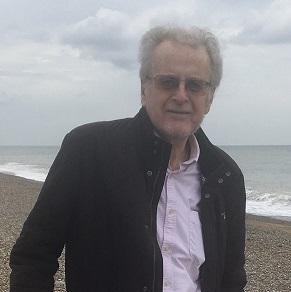
William M Mathew: MA (Glasgow) PhD (LSE) FRHistS, University of East Anglia (previously University of Leicester and University of Missouri St Louis).
Suggested Further Reading by Same Author
‘Experiment and Adventure’: Balfour Defends his Declaration
India, Palestine and the Balfour Declaration
Balfour 1922-23: Fragile commitment and Zionist Response
Rescuing Balfour: Winston Churchill at the Colonial Office 1921-22
Joseph Jeffries and the ‘Palestine Deception’, 1923
